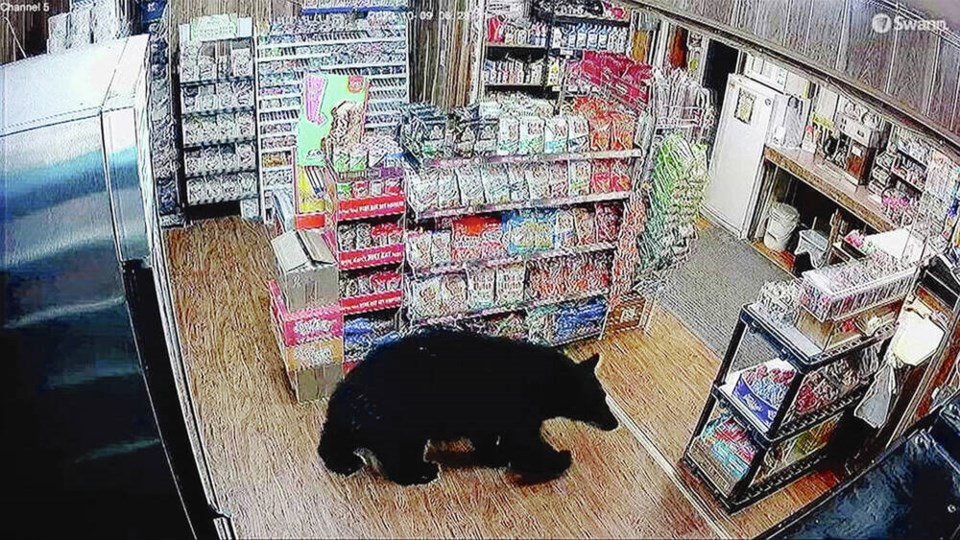After a string of black bear incidents in October, a group of Lake Cowichan residents is offering to work with the town to find ways to co-exist with the animals so they don’t end up being killed.
Lake Cowichan Mayor Tim McGonigle welcomes the suggestion, saying Wednesday that the subject will be on the agenda for the first special public meeting in 2024.
Only one bear was trapped and killed in the Lake Cowichan area between 2016 and 2021, but seven were killed in 2022, Lake Cowichan resident Jaana Ferri told the town’s council at a recent meeting.
In October, two bears were captured and destroyed in the area, after they were deemed poor candidates for relocation.
The B.C. Conservation Officer Service said the bears were not afraid of humans, were conditioned to human food and had gotten into unsecured garbage. One damaged a shed and entered a home.
That month also saw a bear stroll into the convenience store at a Lake Cowichan service station, leaving with a bag of gummy bears.
The conservation officers said that bear was not one of those destroyed.
Bears that have lost their fear of humans and have developed a taste for refuse in unsecured garbage cans are more likely to approach people and be more difficult to drive away, according to the province.
Ferri argues more needs to be done to discourage bears from coming into town in search of food — especially in September and October — so they don’t end up having to be killed.
“We want solutions to end the brutal destruction and killing of our beautiful wild neighbours,” she said.
“There are several communities that have managed to achieve this. We are looking to do the same.”
Port Alberni, Whistler, Kamloops and others have implemented wildlife programs and more are taking the initiative, she said.
B.C. Conservation Officer Service data show that between January and the end of October, there were 24,986 calls about black bears in B.C., and 661 of the bears were destroyed.
Ferri said although black bears are at times destructive, they are rarely aggressive. “But as their habitat shrinks and their food sources become more difficult for them to find, they become scavengers that are also territorial, [and] could become a danger to humans.”
Ferri said she has seen about four times as many bears as usual while out walking, speculating that’s because of their changing habitat. “We are logging more, we are building more homes.”
Climate change is leading to drought, which, in turn, reduces the water level in rivers, resulting in later returns of salmon — a food source for bears, Ferri said.
WildSafeBC and the B.C. Conservation Officer Service told council this year at a special public meeting that “95 per cent” of problems with bears stem from refuse not being stored properly, McGonigle said.
The town has been providing a small grant annually to WildSafeBC, which carries out inspections a few times a year to see if residents are abiding by a bylaw against putting out garbage before pickup day.
The town has beefed up its refuse bylaw by allowing for a warning followed by a possible fine of up $250 for infractions, McGonigle said. It also applies to commercial entities that use contract services to collect refuse.
Enforcement is driven by complaints. “So it is imperative that if we’ve seen contraventions of that bylaw that they be reported.”
The town has considered turning to bear-resistant residential garbage containers, but the move was not approved in last year’s budget discussions. McGonigle said he would not be surprised to see the idea return for consideration this year.
Although the town has been collecting kitchen refuse separately for about seven years, some residents continue to put food scraps into regular garbage, which can attract wildlife.
Another concern is people dumping their home refuse in the town’s ornamental-style garbage receptacles, which then become attractive to bears, he said.
McGonigle said this year could have been an anomaly for wildlife because of the extended drought and lack of berries that are part of the bears’ diet. “This was a very unique summer and I think we are in for more of that in the future.”
Coun. Aaron Frisby said he’s pleased that the community is onboard with efforts to reduce bear contacts. “There is an opportunity now for us to actually make some difference.”
For more information:
-B.C. Conservation Officer Service statistics on black bears:
-.
-



